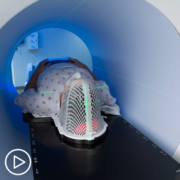What Do Patients Need to Know About Head and Neck Cancer Research?
What Do Patients Need to Know About Head and Neck Cancer Research? from Patient Empowerment Network on Vimeo.
Is there developing research that head and neck cancer patients should know about? Dr. Jessica Geiger explains how treatment approaches are evolving and how patients can stay up-to-date on the latest advances.
Dr. Jessica Geiger is a medical oncologist at the Cleveland Clinic. Learn more about Dr. Geiger.
See More From The Pro-Active Head and Neck Cancer Patient Toolkit
Related Programs:

|

|

Expert Advice for Newly Diagnosed Head and Neck Cancer Patients |
Transcript:
Katherine Banwell:
Cancer research is developing rapidly. What are you excited about when it comes to head and neck cancer research?
Dr. Jessica Geiger:
Well, I think there’s a lot of different clinical trials that are coming out in what we call the neo-adjuvant space so before you go for a surgery. Again, head and neck cancer is a little bit different when we think of other more common cancers.
And what I mean by that is it’s one thing to be able to surgically remove cancer or to ablate it completely with radiation. The problem with the head and neck area as you can imagine, it’s such a small area. There’s a lot of precious real estate there, as I always describe to patients. And so, it’s one thing to cure the cancer, to cut it out completely. But then we have functional and sometimes cosmetic concerns after that, too. So, I think one of the biggest things that we are always trying to look to be successful in is are there therapies, are there treatments where we can shrink down the initial cancer so that the resulting surgery or the fields of radiation are not so severe? So, we’re maintaining the cure rates that we have. We’re improving on the cure rates that we have. But also thinking about how can we improve the quality of life and the function and the cosmetic outcome after their cancer treatment? And I think that’s really exciting.
Katherine Banwell:
It is. It’s great. And I’m sure there’s been so much development in the field, even in the last 10 years.
Dr. Jessica Geiger:
There has. And another comment to make on that point, too, when we’re thinking about clinical trials especially. There’s really two big subsets of squamous cell cancer, head and neck squamous cell carcinoma, and that’s HPV-positive that’s related to the HPV, the human papilloma virus and HPV-negative. HPV-negative is what we think of historically as being caused by years of smoking often with heavy drinking. That’s kind of the traditional head and neck cancer patient. But over the last couple of decades now, there’s a completely different disease that we have recognized. And that’s related to HPV. And these patients tend to be light or never smokers at all. They tend to be younger, different demographic of patients. The good news is those cancers seem to respond better to cancer treatment, particularly radiation- and chemotherapy-based.
So, as I mentioned before, trying a neo-adjuvant approach to kind of reduce the impact of surgery or the impact of radiation, particularly with HPV-related disease. We know that it’s a different disease that behaves much better than HPV-negative. So, trying clinical trials to what we call de-intensify therapy. So, maintaining the high cure rate. But reducing the toxicities related to treatment so that – you know, these are younger patients. They’re cured of their cancer. But they still require a feeding tube. Or they have a lot of chronic pain in the neck. They have a lot of morbidity with the treatment. And so, trying to reduce that down to again, maintain high cure rates, but help with quality of life in the years to come.
Katherine Banwell:
How can patients stay up-to-date on developing research?
Dr. Jessica Geiger:
That’s a really good question.
Every once in a while, there are sound bites or news articles that are kind of in the mainstream press and in the mainstream news. I would just encourage patients to – if they read something or see a headline to reach out to their oncology team and have a discussion. What is this research? What does it mean for me? Does it apply to me? How is this information being used for cancer treatment? How would this impact my treatment or my follow up? It’s really hard to kind of navigate through what is, in terms of research, what is immediately clinically impactful or clinically meaningful at that time.
Katherine Banwell:
Are there any websites that you recommend to patients?
Dr. Jessica Geiger:
The American Head and Neck Society has a good website. And there’s a couple of other, depending on what state you live in or regions of certain states.
There’s a lot of different support groups for head and neck cancer patients that I would encourage patients to reach out. Because especially in the regional, geographic location where you are, it may be worthwhile to be able to have those conversations. Because you can walk down the street and not know if somebody’s had it. But I’ve had more patients over the last several months, especially HPV-related disease patients who have mentioned something to me along the lines of, “I had mentioned to an acquaintance or a friend of a friend. And suddenly, I know three or four other people who have had this cancer. And I had no idea. And now we’re talking about how we have to carry a water bottle with us all the time because we can’t swallow dry foods. And how we have to be very mindful of what we’re eating when we order at a restaurant.” And so, just trying to navigate a bigger world, narrowing it down to where you live to have those meaningful contacts of other patients who have gone through what you have gone through.




